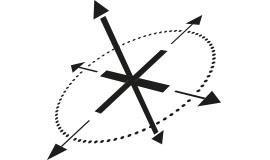SDU’s leadership compass shows the direction for what good leadership means at SDU. It seeks to contribute to SDU’s managers working with their own managerial development in a lifelong perspective. The compass is based on core SDU values such as propriety, accountability, motivation and dialogue, which is reflected in the four perspectives of the compass.
Together with specific management tools and SDU’s programmes for managerial development, the leadership compass constitutes a comprehensive web-based knowledge portal for good leadership at SDU. The leadership compass consists of four guiding and mutually dependent perspectives that SDU’s managers can use for leadership navigation: Direction, Interaction, Commitment and Leadership. The compass provides an opportunity for managers to continuously see beyond everyday life and reflect on their own managerial development.
The primary target group for SDU’s leadership compass is first and foremost SDU’s managers with staff responsibilities. At the same time, managers without staff responsibilities are encouraged to actively use the compass for inspiration.
SDU’s leadership compass is based on the following:
- that leadership is always exercised in contexts, and that managers must navigate in different and not always harmonious contexts. The formal context stipulates that SDU is a state-funded independent university which has the task of conducting research and providing research-based education to the highest international level, disseminating the latest knowledge and collaborating with the surrounding community. The strategic context consists of SDU creating value for and with society with sustainable development in mind by combining classic academic merits within research and education with a dynamic, innovative and decisive position in the university landscape and in society. The economic context is characterised by the fact that the University’s financial framework is largely controlled and regulated by the state, but also consists of competitive and market-determined funds. Within these contexts, SDU’s managers undertake to exercise management with regard to SDU’s articles of association, personnel policy guidelines, pay policies, collective agreements, working environment legislation and sound working conditions, as well as other administrative rules.
- that leadership is a practice that is practised in relationships between people. A manager exercises leadership over and with his/her employees and management colleagues based on formal authority and management rights. The leadership compass aims to help managers to be able to handle the many different types of management tasks that result from working at a large university with a composite university population (researchers, lecturers, technical staff, administrative staff, students) with many connections to the surrounding local, national and global communities.
- that the University is constantly changing, which places demands on the agility of managers and employees. SDU therefore encourages managers at the University to undergo continuous managerial development. Managerial development is an important prerequisite for developing employees, management teams and the University and is productive for well-being, results and for the University to fulfil its purposes.
Leadership is about bringing human skills and resources into play, so that we as a university can pursue our goals and solve our tasks. SDU’s managers must be able to seize new opportunities and be able to prioritise and undertake their responsibilities with respect for research freedom and freedom of expression, involvement of employees, students and partners and the University’s political, economic, social and technical (framework) conditions.
Good leadership helps employees, students, partners and the University to succeed in their purposes and ambitions. In doing so, SDU creates value for and together with society.
